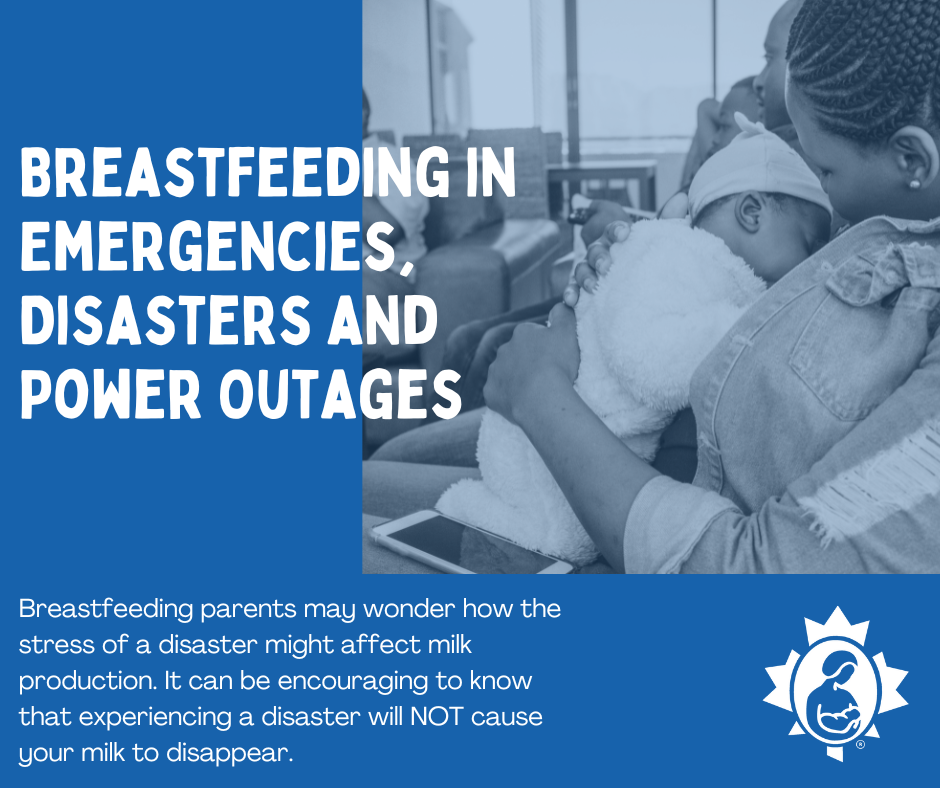
Breastfeeding during a disaster
A disaster or emergency can be extremely stressful and perhaps life-threatening. Babies can be particularly vulnerable during a disaster. Nursing parents may wonder how the stress of a disaster might affect milk production. It can be encouraging to know that experiencing a disaster will NOT cause your milk to disappear. Stress does not prevent production of milk, but it may temporarily interfere with the flow of milk. Stay close to your baby and nurse often. This can help reduce your own stress hormones and keep your milk flowing well.
If your baby must be fed formula, it is important that you prepare it according to the instructions. Use uncontaminated or boiled and cooled water. If you are regularly feeding your newborn formula and have no clean water or electricity, you are encouraged to reestablish breastfeeding as soon as possible (See Establishing Your Milk Supply and Triple Feeding for more information). The amount of milk your body produces depends on:
- your milk supply when you weaned.
- how long it has been since you weaned.
- how well your baby latches.
Some milk is likely to be produced even if your baby is older than four weeks. No matter how much milk your body produces, nursing can be helpful. It will comfort your baby, keep her warm, and help to relax both of you during this stressful time.
If you are nursing an infant and have an older child, you can reestablish nursing with your older child. Or you can offer your older child some expressed milk to provide him extra nutrition during this time. It is important to nurse your infant before offering your milk to your older child.
Supporting others during a disaster In many global disasters, donors send infant formula to relief agencies. These packages of powdered formula are often distributed to all mothers. However, breastfeeding mothers do not require formula. Using this formula can disrupt milk production and negatively impact the health of breastfeeding infants.
If parents cannot read the instructions in their own language, they may mix the formula improperly. They may dilute the formula to make it last longer. Powdered formula that is mixed with unclean water often causes diarrhea. Diarrhea depletes a baby’s body fluids rapidly. This rapid loss of fluids can be fatal.
Powdered formula mixed with unclean water is more dangerous to a baby than a mother breastfeeding with a low milk supply. A nursing baby who is getting just 65% of the calories he needs will likely maintain weight and be adequately hydrated. Even mothers who are only partially breastfeeding should be encouraged to increase the baby’s time at the breast and avoid using unsafe mixtures of formula. Formula should never be diluted to make it go farther.
During a disaster, citizens, relief organizations and breastfeeding support groups can protect babies by supporting nursing mothers with safe shelter, food and a calm presence. It’s important that community groups and disaster relief organizations develop sound emergency plans for safe feeding of infants. This includes support for breastfeeding.
Dealing with a power outage
Power outages happen regularly in Canada in both summer and winter. They can last for hours or several days. If you are feeding your baby directly at the breast, then a power outage should not impact breastfeeding at all.
If you are pumping your milk regularly, then a power outage can impact you in one of two ways:
- Inability to use an electric breast pump.
- Concern about expressed milk in the freezer or fridge.
If you need to pump your milk regularly, you can:
- purchase a battery pack for your electric pump.
- purchase a manual or battery-operated breast pump.
- learn how to hand express your milk.
If you feed your baby your expressed milk, you can:
- feed it to your baby ideally within 4 hours of expressing it, or 6-8 hours in very clean conditions. This will avoid needing to refrigerate or freeze it (see Storing Human Milk).
If you have expressed milk stored in the freezer it is important to prevent your milk from thawing completely.
- Use a gas generator to power the freezer.
- Do not open the freezer door. A full freezer will maintain its temperature for about 48 hours if the door remains closed. A half full freezer can keep its temperature for about 24 hours.
- Take your frozen milk to someone with power.
As long as there are ice crystals in the frozen milk then it is still considered frozen. You can either use it or put it back into the freezer when power is restored.
If you are concerned that your milk production has decreased, see Low Milk Production for more information.
References
Canadian Food Inspection Agency. (2019, September 12). Food safety in an emergency.
Updated 2024
